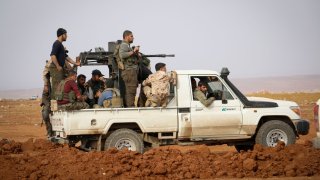Syrian Rebels Didn’t Just Capture Aleppo—They Took Abandoned Military Hardware
After just days of fighting, Syria's second-largest city is once again in rebel hands. The capture of the city is a serious blow to the regime of President Bashar al-Assad not only because it took the Syrian Army—with support from Russia and Iran—nearly five years to take it back but also because vast quantities of military hardware were abandoned.
After just days of fighting, Syria's second-largest city is once again in rebel hands. The capture of the city is a serious blow to the regime of President Bashar al-Assad not only because it took the Syrian Army—with support from Russia and Iran—nearly five years to take it back but also because vast quantities of military hardware were abandoned.
Dozens of tanks, thousands of small arms, and even a handful of Czech-made L-39 Albatros jet fighters are now in the hands of the anti-government forces. The captured weaponry will bolster the strength of the Sunni militant group Hay’at Tahrir al-Sham (HTS), which launched its surprise offensive last week.
Syrian troops regained control of parts of Aleppo in 2016 and fully liberated the city in 2019 with help from Iran, Russia, and the Lebanese militant group Hezbollah. The loss of the city has been seen as a serious setback for Assad, and there have been suggestions his military is a spent force.
Not Fit for a Parade
An Iranian military blogger took to the Telegram social messaging app and suggested the loss of the second-largest city in Syria was an intelligence failure. Little attention was paid to activity on the ground and online, and the attack caught Assad's forces entirely off guard.
However, the problem runs much deeper, said the Iranian blogger, who said Assad's army consists of conscripts, many who are even opposed to his regime. Those who are loyal are poorly paid, and few have received adequate training.
As a result, defensive positions weren’t prepared, and the officers instituted an “ineffective chain of command.”
France24 quoted the blogger as stating, “While any military can face a surprise assault, the ability to hold defensive lines depends on pre-built fortifications, proper training, and the soldiers' willingness to stand their ground—not to mention reliable equipment. Assad's army lacks all of these. It never had them, and the situation has only worsened in the last ten years. Thousands of semi-trained soldiers have been killed, and there is no budget to modernize the army. At this point, these troops aren't even fit for a military parade.”
Other images posted online show the windfall that HTS has received—including crates of handguns, a Russian air defense system, and most notably, a Russian-made T-90A main battle tank (MBT). It is among the most modern armored vehicles currently in service with the Syrian Army. While the exact number operated by Damascus is unknown, HTS has at least one and likely more.
The group was even surprised by its recent gains.
“We succeeded in breaking the first line and then the second and third,” Gen. Ahmed Homsi, the commander of a unit that's been trying to coordinate the rebel offensive, told NPR. “We hit positions of the leadership and succeeded in cutting off communications between them and their troops. That created big chaos for them. It was a big psychological defeat.”
HTS: The Regime’s Most Serious Threat
The anti-government militant group can trace its roots to the earliest days of the Syrian Civil War in 2011, which began during the so-called Arab Spring. However, Assad was able to hang on to power but lost large swaths of his country.
The Islamist group had been designated by the United States and other nations as a terrorist organization, notably when it was known as Jabht al-Nusra and formed an alliance with al Qaeda. However, HTS has disavowed international terrorism and has attempted to refurbish its image as a moderate group even as it retains its conservative religious foundations.
According to NPR, the group has said it has no plans to impose Sharia law in areas it now controls. It has worked with Christian communities, including allowing the rebuilding of churches. In recent days, it has also announced that it will allow displaced civilians to return to their homes.
Whether HTS truly retains its moderate stance has yet to be seen, but it is clear that it could be a force to be reckoned with—and could have the momentum to topple Assad's regime. Yet, even if that does come to pass, given the situation on the ground, it won't end the civil war as there are too many competing factions vying to control Syria.
Author Experience and Expertise: Peter Suciu
Peter Suciu is a Michigan-based writer. He has contributed to more than four dozen magazines, newspapers, and websites with over 3,200 published pieces over a twenty-year career in journalism. He regularly writes about military hardware, firearms history, cybersecurity, politics, and international affairs. Peter is also a Contributing Writer for Forbes and Clearance Jobs. You can follow him on Twitter: @PeterSuciu. You can email the author: [email protected].
Image Credit: Creative Commons and/or Shutterstock.

